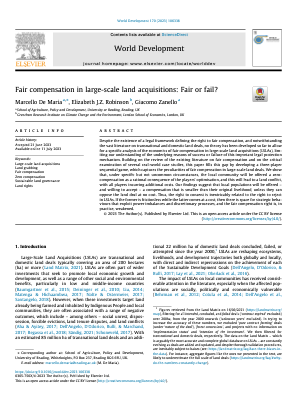Resource information
Despite the existence of a legal framework defining the right to fair compensation, and notwithstanding the vast literature on transnational and domestic land deals, no theory has been developed so far to allow for a specific analysis of the economics of fair compensation in large-scale land acquisitions (LSLAs), limiting our understanding of the underlying reasons of success or failure of this important legal protection mechanism. Building on the review of the existing literature on fair compensation and on the critical examination of several real-world case studies, this paper fills this gap by developing a three-player sequential game, which captures the peculiarities of fair compensation in large-scale land deals. We show that, under specific but not uncommon circumstances, the local community will be offered a zero-compensation as a rational consequence of the players’ optimisation, and this will lead to a land conflict, with all players incurring additional costs. Our findings suggest that local populations will be offered – and willing to accept – a compensation that is smaller than their original livelihood, unless they can oppose the land deal at no cost. Thus, the right to consent is inextricably related to the right to reject in LSLAs. If the former is frictionless while the latter comes at a cost, then there is space for strategic behaviours that exploit power imbalances and discretionary processes, and the fair compensation right is, in practice, weakened.

